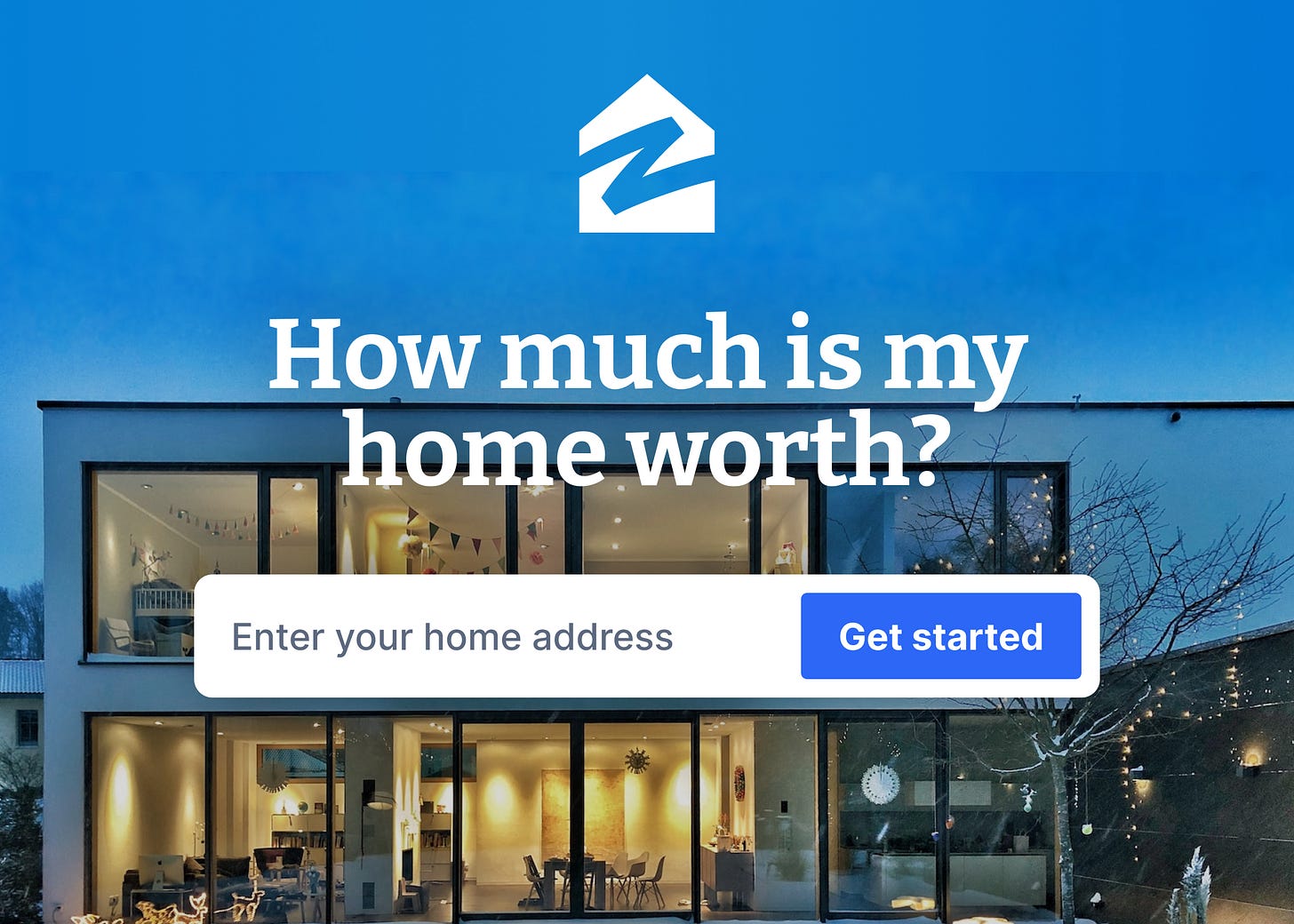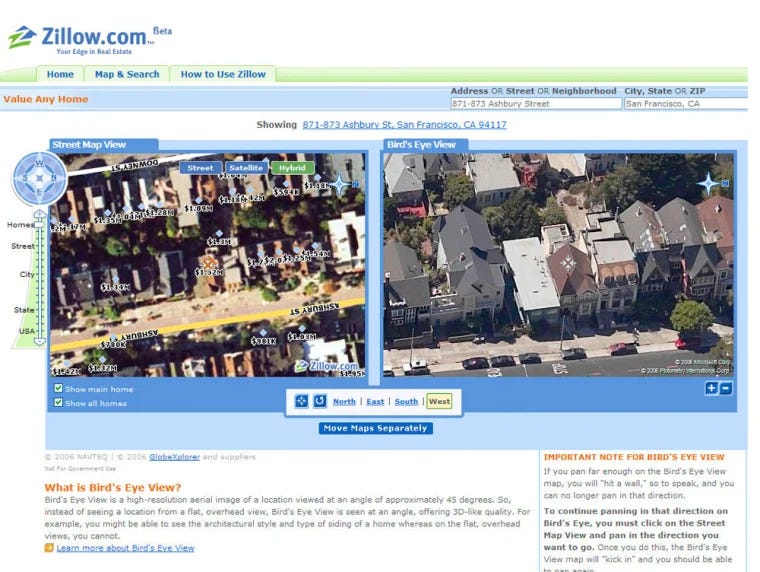In the 1970's, the economist George Akerlof wrote a paper on a concept called "information asymmetry" that won him a Nobel Prize. The paper told the story of car sellers who had an "information advantage" and could take advantage of the buyer's ignorance, theorizing that in most sectors, the seller has the upper hand over the buyer because they have more information about the product they're selling.
So in the example of the car, imagine if both parties had all of the information available about the car in question. Theoretically, they could then negotiate a fair price. If that sounds familiar, that's because 14 years after the paper was first published, a company called Carfax set out to do just that, documenting the accident, maintenance and ownership history of every vehicle.
Like Ewin Barnett III, the founder of Carfax, a generation of entrepreneurs were inspired to build industry-defining companies, driven by the holy grail of information transparency.
One of those founders was a guy named Rich Barton.
There's a very good chance that you've interacted with one of the companies he's built over his tenure, whether you booked a flight through Expedia, bought a home through Zillow or applied for a job through Glassdoor.
Yeah... I know. 🤯
Through Zillow's origin story, we're going to explore the silver thread of information transparency that runs through all three companies and what made them successful.
Let's get into it.
Welcome to Making Product Sense
Join thousands of others like you, learning how to build great products and companies from world-class builders.
Part I: The Playbook
Up until the mid-1990's, flight, hotel and car rental information was only accessible to travel agents through a restricted booking system called the Global Distribution System. Boring name, but powerful technology. It was a worldwide reservation system that allowed travel and hospitality industries such as airlines and hotels to share availability and rental information with travel agents who booked on behalf of their clients.
In 1996, Rich Barton and Lloyd Frink spun up a division within Microsoft called “Microsoft Expedia Travel Services” (quite the mouth full) which aimed to to empower consumers with all of the information they needed to book their own accommodations, unlocking the black box of travel information and effectively cutting out the travel agent middleman.
After shortening the name to Expedia (thank God) and spinning it out as its own company, Rich and Lloyd teamed up once again with some former colleagues from Expedia.
This time, to disrupt real estate.
"With Expedia, we were giving power to the people, giving travelers the power to plan their own trips. After Expedia was acquired, we took some time and we were trying to figure out what the next thing was.
It turns out Lloyd and I were shopping for homes while we were trying to hatch a new business idea. We were having babies and we were really frustrated that we could not find the basic marketplace information that we needed, so the idea came up and punched us right in the forehead while we were thinking about these other things.
It was just like, “Wow, it’s 2005, I can’t believe that we can’t access all this marketplace information. We should give power to the people in real estate, too.” That’s kind of the way we got going."
—Rich Barton, co-founder of Zillow
After hitting a home run with Expedia, Rich and Lloyd's natural instinct was to reuse the winning playbook by cutting out the middleman - the real estate agent. They thought, if you could book a flight online, why couldn't you buy a home online? So for the first few months, they wrestled through the complexities of filling the real estate agent and brokerage roles themselves with an online home auction platform.
But soon, they began to realize that the home buying process was more complex than booking a plane ticket and the agents and brokerages actually brought a tremendous amount of value to the table.
"We thought about being the real estate agent, being the brokerage ourselves. We spent weeks, months doing this project and getting it up and going, and we figured out pretty quickly that there’s a lot of value that real estate agents add and brokers add that was not our area of expertise."
—Lloyd Frink, co-founder of Zillow
While they pivoted away from the real estate auction idea, they weren't deterred from real estate as an industry. There was still plenty of data that they could bring to light and empower the home buyers without totally removing the middleman like they had before. That's when they had the idea that would set them on a trajectory to $9B.
Acquisition: what made them interesting?
They unlocked the black box of previously-hidden information.
Expedia: flight, hotel and rental information was only accessible to travel agents through a Global Distribution System (GDS).
Zillow: home information was only accessible to real estate agents through a Multiple Listing Service (MLS).
Glassdoor: salary information was proprietary and ambiguous information, unique to each company.
Part II: The Zestimate
As we've established, buying a home is an immensely complex process. So for those of us who are not trained and licensed real estate professionals, we need some sort of proxy that distills every home buying variable down into a manageable number.
The price.
Price takes into account the location, square footage, acreage, maintenance, location, curb appeal, amenities, construction quality, location, historical value, inflation, interest rates, location, supply and demand. Did I mention location?
Basically, the price is the best way for the layman to know if something is worth seriously considering or just worth admiring through the car window.
And since a home is not only a purchase but an investment, you hope that your home appreciates. But it's really difficult to know just how much your home has appreciated by unless you either sell it and get an agent to help you price it or, once again, do a lot of complicated math taking into account the endless list of variables I just mentioned.
So if you could, say, look up your home value any time you wanted on the internet, it would be kind of revolutionary.
"The internet bubble had burst so the stock market wasn't as interesting to people but the housing market was on a tear and somebody basically drew a stock chart on the board and said, 'what if we could create this stock chart but have it be your house value?' and that's when everybody kind of inhaled simultaneously and was like, 'Oh... that is interesting.'"
—Rich Barton, co-founder of Zillow
After they locked their sights on the home value, they of course had to do all of that complicated math I talked about. Thankfully, the team was up for the job and even had an ace up their sleeve. With the help of Dr. Stan Humphries, who was leading the personalization arm of Expedia, they began manually pulling housing data into a spreadsheet and remixing it until they landed on the algorithm that would blow the lid off of the real estate blackbox.
"When we were first starting out, we went to the King County website and we pulled the public data down on what the recent sales were and then we’d go up to the MLS websites and we’d pull that data down and what homes are on the market.
We’d try to put it into a spreadsheet to try to figure out, 'Okay, what is the home that we’re looking at? How much should that be worth on dollars per square foot? That one sold a year ago and it must have appreciated this much by now.' We’d basically be doing all this math to get a general idea for what a home would be worth. It was just mind-boggling that there was no website that did this. It’s just math."
—Lloyd Frink, co-founder of Zillow
Now for the juicy bits.
After dialing in their algorithm, the team had an internal debate about whether they should serve up a range or just a point value per home. Ultimately, while a range would be the safer option, they opted to go with a point value because "points are more provocative than ranges." And of course they are! You're calling a shot and, even if it's wrong, a lot of people may see it as fact. In fact, they ran into this exact issue years later in 2017.
“Homeowners had sued Zillow in May, complaining that its computer algorithm for Zestimates often undervalued their homes, sometimes by hundreds of thousands of dollars, making them harder to sell, and constituted illegal “appraisals.”
Despite the unavoidable backlash that such a move would invite, the decision was critical to their early success. As I talked about in my article on Waze, they also made strategic product decisions such as showing other Waze-ers on the map in an effort to evoke emotion from their users. Those emotions drive attention, engagement, and hopefully, loyalty.
Another fascinating product decision was to show a price for every single home. Today, that might sound obvious, but in 2006, other Automated Valuation Models (AVMs) would only report on the homes they could be sure of which typically resulted in a scattered number of listings around the middle of the market.
But how boring is that? When you're driving through a nice neighborhood and see you see a really cool house, how many of you pull out your phone, open Zillow and peep the price tag? Don't be shy. We all do it.
Even though the obvious use case for Zillow is searching for homes to buy within your price range, the two most tantalizing use cases of Zillow are:
Looking up the homes of people you know.
Looking up the homes of crazy rich people.
To accomplish both of these use cases, you MUST generate a price for every home. Once again, they opted for the emotionally-charged path.
"It's so cool and so innovative to say, 'Oh, my god, I can grab my kid's school roster and I can Zillow everybody at my kid's school and see what everyone's house is worth, see what everyone paid for the home.' That was just, like, this, 'Oh, my god' kind of thing that launched the company in 2006."
—Spencer Rascoff, founding team and former CEO of Zillow
There's something a little personal - a little voyeuristic - about it, as though you're peeking through a window into another person's life. I think that combination of useful and emotional is what made the catch on like wildfire as we'll see in the next section.
Engagement: what made them addicting?
They built an emotional, voyeuristic experience into the product.
Expedia: look up the prices of your perfect trip as you day dream at work.
Zillow: look up a celebrity’s house as you walk down the streets of Manhattan.
Glassdoor: Look up your neighbor’s salary as you sip punch at their annual Christmas party.
Part III: The Launch
During the months leading up to the launch, the Zillow team was tight-lipped about what they were building. Despite the media's rabid interest in what Rich and Lloyd, the two ex-Expedia execs (geeze that’s a lot of “ex”s in a row), were up to, they couldn't get the scoop. In fact, the folks they were hiring wouldn't even know what they were working on until after they were hired.
All the while, the team was fine tuning the tool, leaning into the shock and exhilaration that would inevitably follow once the entire world could see how much their friend just dropped on their new house in the burbs.
"I knew before we launched that we were going to have a great reaction because I remember when the test site was up, I was Zillowing all of my friends and family, for a couple of weeks, just pulling up any address that I could remember or had some association with or had lived in or had a friend that lived in.
I saw how fun and interesting and exciting it was to do this. Like the feeling that you had when you first Googled yourself or Googled a friend, and now, of course, it’s second nature."
—Spencer Rascoff, founding team and former CEO of Zillow
In preparation for the big day, the executive team spoke with over 100 journalists of high-profile publications under embargo so when they finally launched in February 2006, it was a media blitz driving millions and millions of new users to zillow.com.
"We had over a million people visit the site by the second day and I think by the fifth day we had over two million people and the site crashed."
—Spencer Rascoff, founding team and former CEO of Zillow
For the first couple of years, Zillow was riding high on the unbelievable amount of organic traffic they had pouring into their site. But if you paid attention to the year they launched, you know that 2 years later, all hell broke loose as the 2008 housing crisis unfolded before their eyes.
Like at Expedia, they knew that unlocking the black box of data was interesting but ultimately not enough. With the state of the market, Rich knew that it would be imperative for them to begin making money to keep the company afloat as it would be difficult to raise more funding given the sinking ship of their particular niche. Since 2008, they've begun serving home buyers, real estate professionals, mortgage lenders and property management services, providing them with invaluable data and tools that hadn't existed before.
Retention: what made them useful?
They built tools around the data that made it not only interesting but critical.
Expedia: researching and then booking flights, hotel rooms and rental cars.
Zillow: researching and then buying a home.
Glassdoor: researching and then applying for jobs.
Takeaways
At the end of the day, all companies are data companies. But as I mentioned in my article on Jasper.ai, how you acquire, remix and interact with that data will lead you to success or failure. While Zillow has had its fair share of ups and downs, their $9B market cap proves just how well that company has executed over the last 17 years.
To wrap it up,
Acquisition: Make it interesting by unlocking data that was previously locked.
Engagement: Make it addicting by designing for emotion.
Retention: Make it useful by building tools on top of that data.
That’s all for this one - I’ll catch ya next week.
—Jacob ✌️
❤️ Smash that heart!
If you enjoyed this article, smash that heart icon to show some love! 🙏







Although they changed the game in many ways you mentioned...and I realize the accuracy can be questionable...I have always loved the Zestimate. If you're trying to sell or buy (or you're a realtor) you probably hate it, but as someone who loves to get some validation on appreciation of my property it's pretty awesome.